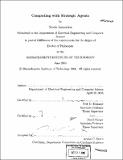Computing with strategic agents
Author(s)
Immorlica, Nicole, 1978-
DownloadFull printable version (10.50Mb)
Other Contributors
Massachusetts Institute of Technology. Dept. of Electrical Engineering and Computer Science.
Advisor
Erik D. Demaine and David Karger.
Terms of use
Metadata
Show full item recordAbstract
This dissertation studies mechanism design for various combinatorial problems in the presence of strategic agents. A mechanism is an algorithm for allocating a resource among a group of participants, each of which has a privately-known value for any particular allocation. A mechanism is truthful if it is in each participant's best interest to reveal his private information truthfully regardless of the strategies of the other participants. First, we explore a competitive auction framework for truthful mechanism design in the setting of multi-unit auctions, or auctions which sell multiple identical copies of a good. In this framework, the goal is to design a truthful auction whose revenue approximates that of an omniscient auction for any set of bids. We focus on two natural settings - the limited demand setting where bidders desire at most a fixed number of copies and the limited budget setting where bidders can spend at most a fixed amount of money. In the limit demand setting, all prior auctions employed the use of randomization in the computation of the allocation and prices. (cont.) Randomization in truthful mechanism design is undesirable because, in arguing the truthfulness of the mechanism, we employ an underlying assumption that the bidders trust the random coin flips of the auctioneer. Despite conjectures to the contrary, we are able to design a technique to derandomize any multi-unit auction in the limited demand case without losing much of the revenue guarantees. We then consider the limited budget case and provide the first competitive auction for this setting, although our auction is randomized. Next, we consider abandoning truthfulness in order to improve the revenue properties of procurement auctions, or auctions that are used to hire a team of agents to complete a task. We study first-price procurement auctions and their variants and argue that in certain settings the payment is never significantly more than, and sometimes much less than, truthful mechanisms. Then we consider the setting of cost-sharing auctions. In a cost-sharing auction, agents bid to receive some service, such as connectivity to the Internet. A subset of agents is then selected for service and charged prices to approximately recover the cost of servicing them. (cont.) We ask what can be achieved by cost -sharing auctions satisfying a strengthening of truthfulness called group-strategyproofness. Group-strategyproofness requires that even coalitions of agents do not have an incentive to report bids other than their true values in the absence of side-payments. For a particular class of such mechanisms, we develop a novel technique based on the probabilistic method for proving bounds on their revenue and use this technique to derive tight or nearly-tight bounds for several combinatorial optimization games. Our results are quite pessimistic, suggesting that for many problems group-strategyproofness is incompatible with revenue goals. Finally, we study centralized two-sided markets, or markets that form a matching between participants based on preference lists. We consider mechanisms that output matching which are stable with respect to the submitted preferences. A matching is stable if no two participants can jointly benefit by breaking away from the assigned matching to form a pair. (cont.) For such mechanisms, we are able to prove that in a certain probabilistic setting each participant's best strategy is truthfulness with high probability (assuming other participants are truthful as well) even though in such markets in general there are provably no truthful mechanisms.
Description
Thesis (Ph. D.)--Massachusetts Institute of Technology, Dept. of Electrical Engineering and Computer Science, 2005. Includes bibliographical references (p. 179-189).
Date issued
2005Department
Massachusetts Institute of Technology. Department of Electrical Engineering and Computer SciencePublisher
Massachusetts Institute of Technology
Keywords
Electrical Engineering and Computer Science.